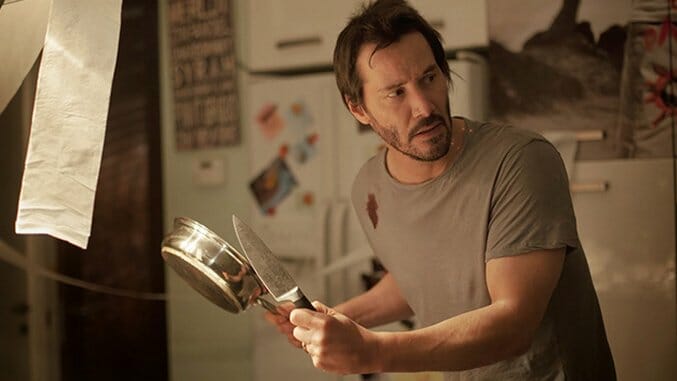Knock Knock

For the past few years I’ve been bemoaning the decline of the mid-range genre film: the action movie or horror flick that’s neither a micro-budget, found-footage opus straining against its resources, nor an oppressive studio behemoth. That mid-range has always been the breeding ground for many of America’s best, most enduring films, where masters like Don Siegel, Nicholas Ray and Anthony Mann plied their trade under the classical studio system, and where more recently auteurs like John Carpenter and Walter Hill have kept the genre film tradition alive.
So alive that, looking at 2015, we seem to be in a kind of genre renaissance. In just the last few months we’ve had Joel Edgerton’s The Gift, M. Night Shyamalan’s The Visit, David M. Rosenthal’s The Perfect Guy and the Dowdle brothers’ No Escape, all smart, stylish thrillers that bend the conventions of their genres to fulfill intimate, personal agendas and expression. Economical in the best sense, with just enough scale to tell their stories without smothering them, these films cram a surprising number of ideas and issues into their compact running times. Not all of these movies may be as great as Hill’s or Carpenter’s best work, but then again, what is?
Knock Knock makes a play for that echelon. Eli Roth’s second theatrical release in a matter of weeks thanks to some distribution snafus with The Green Inferno, Knock Knock is pure cinematic oxygen, a movie that aims to be a classic and brilliantly succeeds at everything to which it aspires. Part cautionary tale, part satire, part horror film, part erotic thriller, it’s Fatal Attraction for the social media era—yet that description does little to indicate just how riveting it is. This is a movie of supreme confidence—it starts strongly and only gets better in every scene—a thriller that invites plenty of comparisons to the works by masters of the form: Hitchcock, Polanski, De Palma. It earns these comparisons.
The story, loosely inspired by an obscure 1977 drive-in flick called Death Game, follows Evan (Keanu Reeves), an architect and family man who’s stuck at home working on Father’s Day weekend while his wife and kids leave town. Alone, he answers the door to a couple of attractive young women (Lorenza Izzo and Ana de Armas) who show up seeking help; it’s a stormy night, and they’re lost. They casually flirt with the uncomfortable Evan, until he starts to get a little more comfortable with the situation…and before long, a chain of events is set in motion that has the potential to destroy Evan’s carefully constructed domestic life.
You can probably imagine the general direction of Knock Knock’s story going in, particularly if you’ve ever seen Play Misty for Me or the aforementioned Fatal Attraction (or Polanski’s Death and the Maiden, for that matter). What you can’t predict are the details, or Roth’s elegant execution—or maybe you can, if you’ve been paying attention at all to what the director has been doing for the past 13 years. Starting with Cabin Fever and continuing on through his subsequent directorial efforts (particularly the masterful and still underrated Hostel: Part II), Roth has always been one of the most subtle and expressive visual stylists in horror. There are no gimmicks in his work, just clean, clear frames in which the director uses color, camera movement and composition to pack the maximum number of ideas into the minimum possible minutes of running time.
“Subtle” might seem like a strange word to describe the work of the guy who ended Hostel: Part II with a man whose penis is cut off and then fed to a dog, but it’s precisely the boldness of Roth’s horror that has blinded some critics to the sophistication of his technique. Roth is rigorous about finding the correct form through which to convey his ideas. Thus, Hostel transitions from the palette and camera style of an ’80s teen sex comedy to a bleak and desaturated, Schindler’s List-inspired hellscape, and The Green Inferno begins in a New York with compositions and color modeled on the work of Sydney Pollack and Nora Ephron and ends in a jungle with visual strategies borrowed (but not stolen, because Roth always adds his own twist) from Mel Gibson’s Apocalypto. Like his friend and colleague Quentin Tarantino, and like Martin Scorsese and De Palma before him, Roth rabidly absorbs film history to apply it to his own work—carving out and then insuring his own place in that history.
-

-

-

-

-

-

-

-

-

-

-

-

-

-

-

-

-

-

-

-

-

-

-

-

-

-

-

-

-

-

-

-

-

-

-

-

-

-

-

-








































